Fitness trackers also called fitness bands, or fitness watch is a mobile electronic device, or a tracker worn or attached to a user for monitoring health-related metrics.
These fitness trackers are equipped with accelerometers with varying degrees of accuracy in measurements such as the number of steps walked, calories burned, heart rate, heart rate variability, and other biometric data.
General, fitness trackers can be classified into four categories: wrist gadgets, hip gadgets, shoe gadgets, and chest gadgets. With the rapid growth of technology, more and more fitness trackers are rolled out in the market to meet the different needs of users, which vary in size and weight.
Smallest Fitness Trackers On The Market
Here are 5 smallest fitness trackers in the market:
1. Garmin vivosmart 4
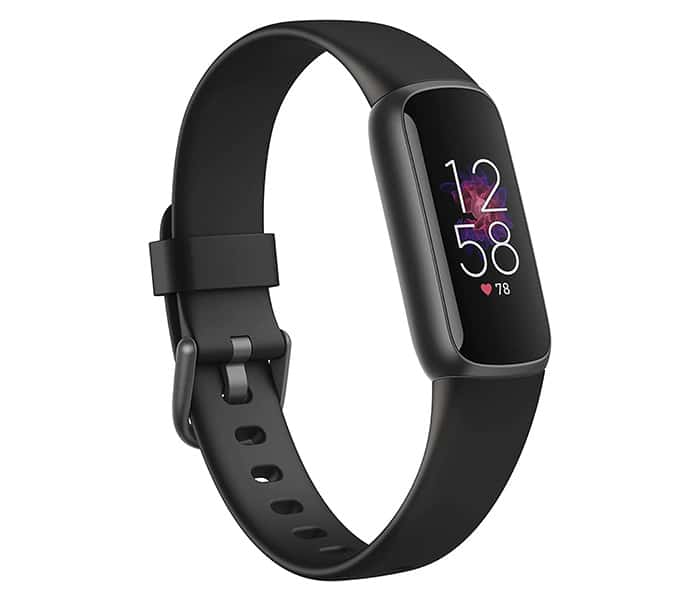
The Garmin Vivosmart 4 has some class. It is a sleek, easy to read display with a stylish edge, and starts with a super slim wristband coming in at only 0.54” wide and a quarter inch thick. It is easily read even in bright light and comes in black or white.
This line of Garmin Vivosmart includes Pulse Ox which measures your oxygen levels during your sleep, a fairly accurate step counter, and automatically begins to track your heart rate all day long and provides a measurement once ten minutes of activity has been completed.
Unlock your energy with body energy monitoring, VO2 max, and all-day stress tracking measurements. Once you learn what carries these activities, you will be able to use them throughout your day to help complete everything you want.
The Vivosmart 4 is water resistant up to 50 meters providing you with the opportunity to stroll through the park, rain or shine. Take a swim or shower and you won’t even need to remove the tracker.
All music can be controlled right from your wrist by playing, pausing, and switching tracks. Each device should be paired through the Garmin Connect App before any use.
Pros
- Ease of use
- Petite and fashionable
- Wrist-based heart rate monitor
- Body battery energy monitoring
- VO2 max and fitness age estimation
- All-day stress tracking
- Smart notification
Cons
- Text response not available
- Activity tracking could be more robust
2. Fitbit Luxe Fitness and Wellness Tracker
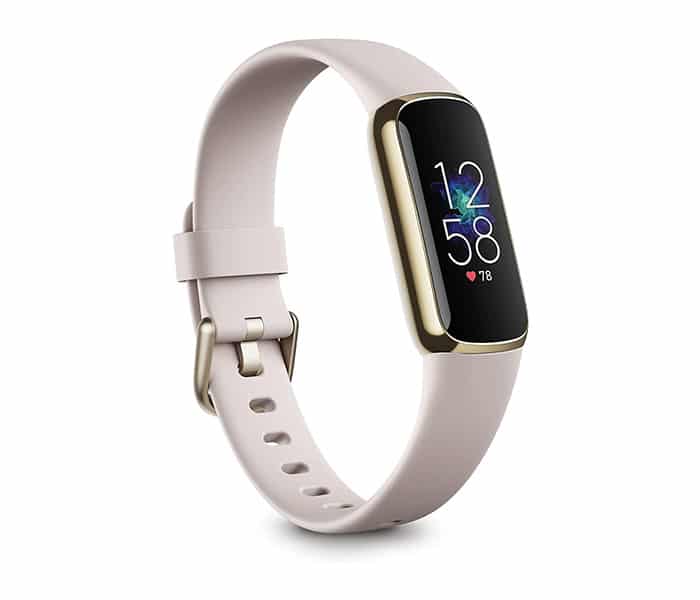
Fitbit Luxe is a tracker that doubles as smart jewelry. It features sleep score tracking and sleep tracking and any single notification can be received from the Fitbit app.
You will feel a buzz once you reach your target heart rate zone while earning active zone minutes giving you the ability to feel a sense of accomplishment throughout your workout.
You get a 6-month subscription to Fitbit Premium after activating your trial within 60 days of your device activation. This way you can make sure you receive everything you expect.
The 24/7 heart rate tracking will help you maximize your exercise, understand your resting heart rate trends, and become aware of calorie burn.
All you need to do to connect the Luxe to your phone’s GPS so you will be able to see your pace, and distance and track your fitness goals.
Pros
- Robust heart-rate tracking
- Reminders to move
- Personalized suggestions
Cons
- High cost
- Lack of apps
3. Fitbit Flex 2
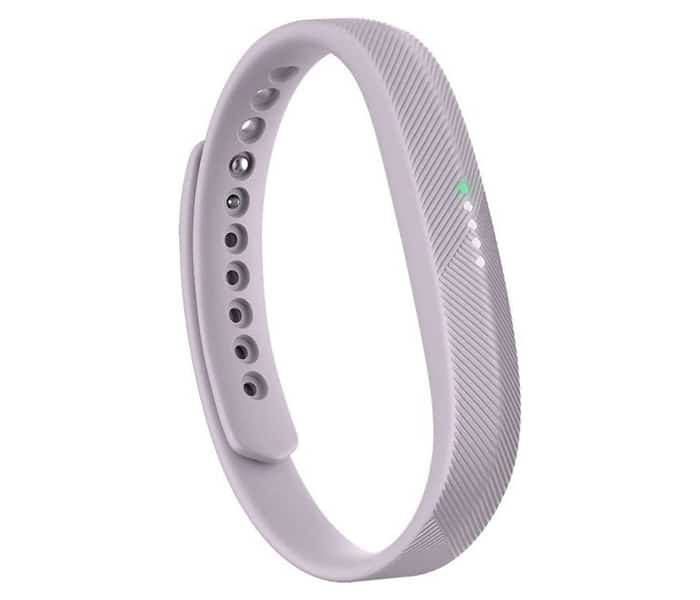
Tracking your daily steps has never been easier with the Flex 2. There are several different LED lights located on the tracker which display the different activity and sleep goals. This Fitbit can be worn on your wrist or you can use the accessory.
Put on the swim-proof accessory and feel confident enough to wear it when you are in the shower or the pool. The blinking colored lights will tell you the exact number of your steps performed and more notifications for your activity.
Sync the Flex 2 to the Fitbit Live Smart Tracker app to get personalized fitness guidance and connect with friends for a little added motivation. There are several different designs to choose from to meet your customized wristband needs.
Pros
- Wide range of wristbands and pendants to choose from
- Mobile reminders
- Tracks sleep time
- Water resistance
Cons
- No display of numbers
4. Garmin vívosmart® 5
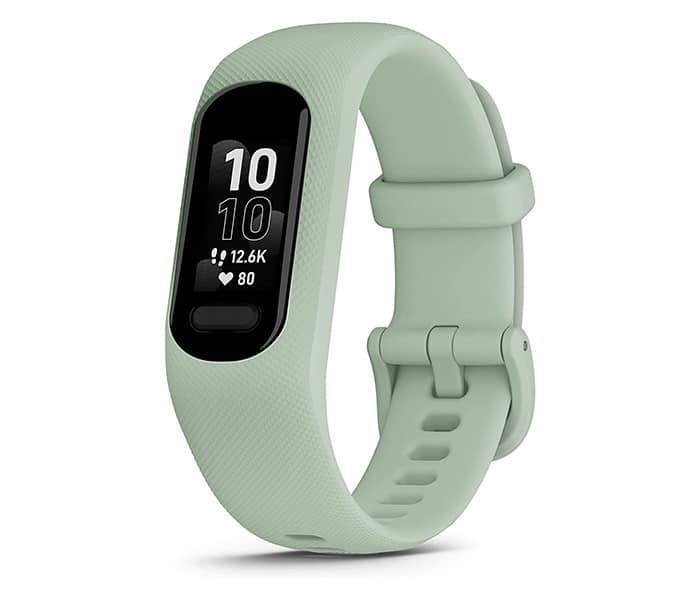
This fitness tracker has an easy-to-use interface with a touchscreen and button interface. There is also a brighter and bigger display than the previous version with larger text.
The Vivosmart 5 can monitor your respiration, pulse ox, body battery energy levels, women’s health, hydration, stress, and heart rate. You can also get a score for your sleep quality and get insights on how to improve your sleep via the Garmin Connect app.
This fitness tracker allows you to set goals and track your progress for walking, running, yoga, cardio, and swimming among other activities. You can also connect the tracker to your smartphone’s GPS to track your outdoor walks, runs, and rides.
Pros
- Easy to use
- Objectively measures sleep
- Tracks a variety of activities
- Connects to smartphone’s GPS
Cons
- Lacks some key smartwatch features
5. Fitbit Inspire 2
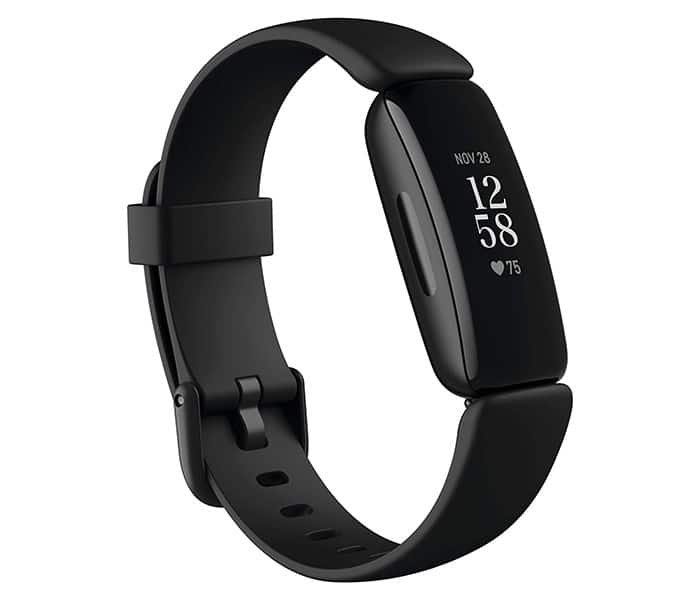
The Fitbit Inspire 2 is a tracker that doubles as smart jewelry. It features sleep score tracking and sleep tracking and any single notification can be received from the Fitbit app.
You will feel a buzz once you reach your target heart rate zone while earning active zone minutes giving you the ability to feel a sense of accomplishment throughout your workout.
You get a 6-month subscription of Fitbit Premium after activating your trial within 60 days of your device activation. This way you can make sure you receive everything you expect.
The 24/7 heart rate tracking will help you maximize your exercise, understand your resting heart rate trends, and become aware of calorie burn.
All you need to do to connect the Inspire 2 to your phone’s GPS so you will be able to see your pace, and distance and track your fitness goals.
Pros
- Robust heart-rate tracking
- Reminders to move
- Personalized suggestions
Cons
- High cost
- Lack of apps
Things to Consider Before Buying a Fitness Tracker
When you’re looking for a fitness tracker, it’s important to consider what you want to use it for. If you’re looking for something to wear all day, you’ll want a tracker with long battery life.
If you’re looking for something to track your activity, you’ll want a tracker with GPS. And if you’re looking for something to track your sleep, you’ll want a tracker with sleep tracking.
Additionally, it’s important to consider the different features offered by each tracker. Some trackers have heart rate monitors, while others do not. Some trackers have more advanced features, such as VO2 max and body battery energy monitors.
Ultimately, the tracker you choose should be the one that has the features you want and need.
How to Choose a Fitness Tracker
Connectivity
This aspect mainly concerns compatibility and transfer of data. Most fitness trackers use Bluetooth Low Energy (BLE) technology for connecting to smartphones. It is a power-saving technology that helps in maintaining the battery life of the tracker.
Some fitness trackers also come with a built-in USB dongle that can be used for transferring the data from the tracker to a PC or laptop.
Battery
A fitness tracker is of no use if it needs to be charged every day. A good fitness tracker should have a long battery life so that it can be used for a week or more without the need for a recharge.
Some fitness trackers come with a replacement battery, while others come with a charging Cradle.
Design
A fitness tracker should be comfortable to wear all day long. It should also be stylish enough to be worn as a fashion accessory. Some fitness trackers come with replaceable bands while others come with built-in bands.
Size
Fitness trackers come in different sizes. Some are small and can be worn on the wrist like a watch, while others are larger and need to be worn on the waist. It is important to choose a tracker that is the right size for you.
Water resistance
If you are someone who likes to swim or take showers with your tracker on, then you should choose a tracker that is water resistant. Some fitness trackers are water resistant up to 50 meters, while others are water resistant up to 100 meters.
Warranty
Most fitness trackers come with a one-year warranty. Some companies offer an extended warranty of two or three years. It is always better to choose a tracker with a longer warranty.
IOS OR Android Compatibility
Some fitness trackers are only compatible with iOS devices, while others are only compatible with Android devices. It is important to choose a tracker that is compatible with the type of device you have.
How Often Should You Replace a tracker.
How often you need to replace your fitness tracker depends on a few factors, such as how frequently you use it, the quality of the device, and your personal goals. If you are using your tracker daily and relying on it to provide accurate data, you may need to replace it every 6-12 months.
However, if you only use your tracker occasionally or don’t rely on it for precision, you may be able to extend the replacement interval to 2-3 years.
The quality of the device also affects how often it needs to be replaced. Higher-end fitness trackers usually have longer lifespans than budget models. If you are using a basic tracker, you may find that it needs to be replaced more frequently due to wear and tear or inaccurate data.
Finally, your personal goals will also dictate how often you need to replace your fitness tracker. If you are training for a specific event or trying to lose weight, you may need to upgrade to a more advanced tracker that can provide more detailed data. Alternatively, if you are just using your tracker for general fitness, you may not need to replace it as often.
In general, most people should replace their fitness trackers every 6-12 months. However, the interval may be longer or shorter depending on your individual needs.
Conclusion
In conclusion, fitness trackers are a great way to track your fitness goals and progress. There are a variety of different fitness trackers available on the market, so it is important to consider what you want to use it for before you buy one.
Additionally, it is important to consider the different features offered by each tracker and choose one that has the features you want and need. Ultimately, the tracker you choose should be the one that best meets your fitness needs and goals.